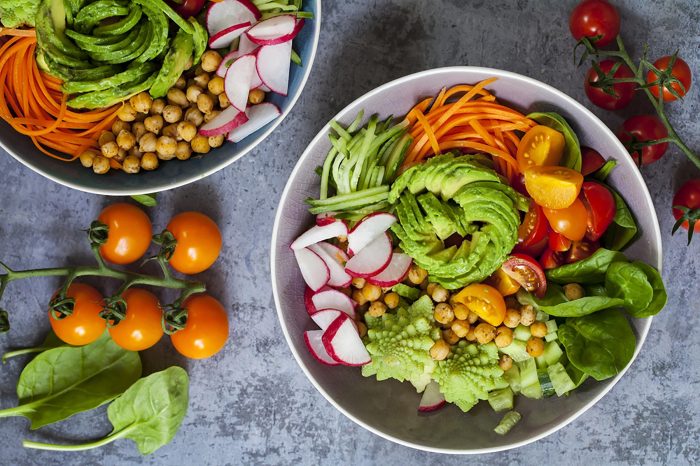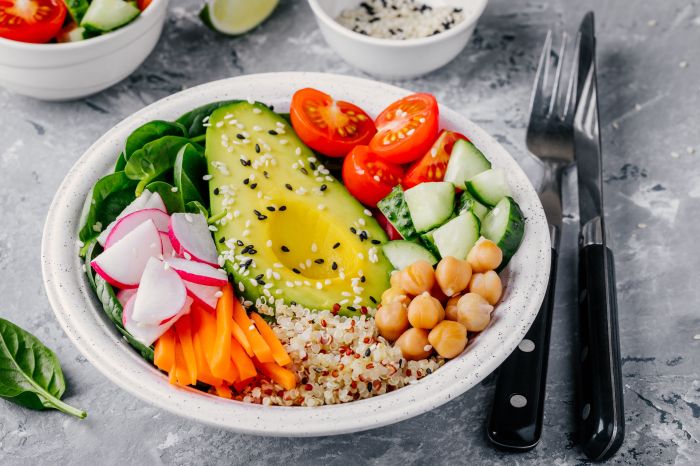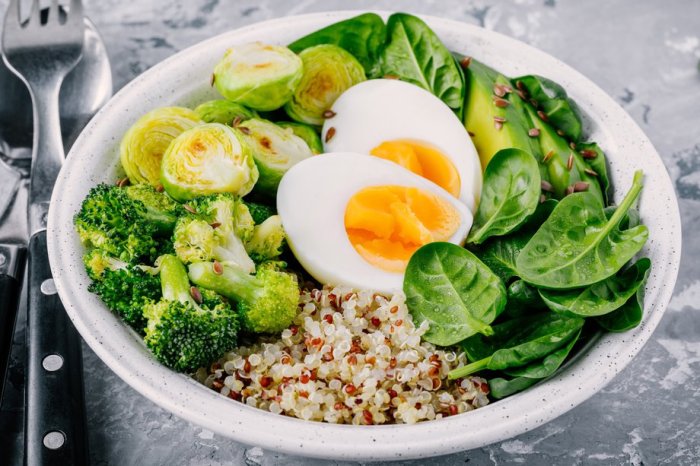Embark on a culinary journey into the world of vegetarian foods to eat, where taste and nutrition intertwine to create a symphony of health and flavor. From protein-packed legumes to nutrient-rich fruits and vegetables, this comprehensive guide will empower you to create balanced and satisfying vegetarian meals.
Delve into the essential nutrients vegetarians need and discover the myriad ways to incorporate them into your diet. Learn how to plan meals that meet your nutritional requirements and explore a collection of delicious recipes that will tantalize your taste buds and nourish your body.
Vegetarian Protein Sources
A vegetarian diet can provide all the essential nutrients the body needs, including protein. There are many different plant-based foods that are good sources of protein, and each one has its own unique nutritional profile.
Some of the best vegetarian protein sources include:
- Legumes, such as beans, lentils, and peas, are excellent sources of protein, fiber, and iron.
- Soy products, such as tofu, tempeh, and edamame, are complete proteins, meaning they contain all of the essential amino acids the body needs.
- Nuts and seeds, such as almonds, walnuts, and chia seeds, are good sources of protein, healthy fats, and fiber.
- Quinoais a complete protein that is also a good source of fiber, iron, and magnesium.
- Seitanis a wheat-based meat substitute that is a good source of protein, iron, and fiber.
The following table compares the protein content of different vegetarian foods:
| Food | Protein (grams per 100 grams) |
|---|---|
| Tofu | 8 |
| Tempeh | 19 |
| Edamame | 11 |
| Beans | 8-15 |
| Lentils | 9-11 |
| Peas | 5-8 |
| Nuts | 15-20 |
| Seeds | 15-30 |
| Quinoa | 14 |
| Seitan | 20 |
As you can see, there are many different vegetarian foods that are good sources of protein. By eating a variety of these foods, you can ensure that you are getting all the protein you need.
Essential Nutrients for Vegetarians

Vegetarians need to pay attention to their diet to ensure they’re getting all the essential nutrients their bodies need. Some of the most important nutrients for vegetarians to focus on include protein, iron, calcium, and vitamin B12.
Protein is essential for building and repairing tissues, and it can be found in a variety of plant-based foods, such as beans, lentils, tofu, and tempeh. Iron is important for carrying oxygen throughout the body, and it can be found in leafy green vegetables, beans, and fortified cereals.
Calcium is essential for strong bones and teeth, and it can be found in dairy products, leafy green vegetables, and fortified plant-based milks. Vitamin B12 is essential for the nervous system and blood cells, and it can only be found in animal products.
Vegetarians can get vitamin B12 from fortified foods, such as cereals and plant-based milks, or from supplements.
Protein
Protein is an essential nutrient that helps build and repair tissues. Vegetarians can get protein from a variety of plant-based foods, such as beans, lentils, tofu, and tempeh. These foods are all high in protein and can help vegetarians meet their daily protein needs.
Iron
Iron is an essential nutrient that helps carry oxygen throughout the body. Vegetarians can get iron from leafy green vegetables, beans, and fortified cereals. These foods are all good sources of iron and can help vegetarians meet their daily iron needs.
Calcium
Calcium is an essential nutrient that helps build strong bones and teeth. Vegetarians can get calcium from dairy products, leafy green vegetables, and fortified plant-based milks. These foods are all good sources of calcium and can help vegetarians meet their daily calcium needs.
Vitamin B12
Vitamin B12 is an essential nutrient that helps the nervous system and blood cells function properly. Vitamin B12 is only found in animal products, so vegetarians need to get it from fortified foods, such as cereals and plant-based milks, or from supplements.
Meal Planning for Vegetarians
Meal planning is essential for vegetarians to ensure they are consuming a balanced and nutritious diet. By planning ahead, vegetarians can make sure they are getting all the nutrients they need from plant-based sources.
A well-planned vegetarian meal plan should include a variety of nutrient-rich foods from all food groups. This includes fruits, vegetables, whole grains, legumes, nuts, and seeds.
Sample Meal Plan
Here is a sample meal plan for vegetarians that includes a variety of nutrient-rich foods:
- Breakfast:Oatmeal with berries and nuts
- Lunch:Lentil soup with a side salad
- Dinner:Tofu stir-fry with brown rice
- Snacks:Fruit, vegetables, nuts, and seeds
This meal plan provides a good balance of protein, carbohydrates, and healthy fats. It also includes a variety of vitamins, minerals, and antioxidants.
Tips for Creating Healthy and Satisfying Vegetarian Meals
- Include a variety of foods from all food groups.This will help ensure that you are getting all the nutrients you need.
- Choose whole, unprocessed foods whenever possible.These foods are more nutrient-rich than processed foods.
- Cook meals at home.This gives you more control over the ingredients and allows you to make healthier choices.
- Make vegetarian meals flavorful.Use herbs, spices, and other seasonings to add flavor to your dishes.
- Don’t be afraid to experiment.There are many delicious vegetarian recipes available online and in cookbooks.
Vegetarian Recipes

Vegetarian cuisine offers a wide array of delectable and nutritious dishes that cater to diverse tastes and dietary needs. Whether you’re a seasoned vegetarian or just exploring the plant-based world, this collection of recipes will inspire you with flavorful and satisfying options for every meal.
Embarking on a vegan lifestyle can be a transformative experience. To navigate this journey seamlessly, consider exploring resources like how to eat a vegan diet. This comprehensive guide offers valuable insights into transitioning to a plant-based diet, providing practical tips and essential information to support your healthy and ethical choices.
From hearty breakfasts to light snacks, each recipe is carefully crafted to provide a balanced intake of essential nutrients and tantalize your taste buds. With clear instructions and helpful cooking tips, these recipes are accessible to home cooks of all skill levels.
Breakfast, Vegetarian foods to eat
- Quinoa Breakfast Bowl:A protein-packed bowl featuring quinoa, fruits, nuts, and a drizzle of honey.
- Veggie Omelet:A classic omelet filled with an assortment of chopped vegetables, such as bell peppers, onions, and mushrooms.
- Vegan Pancakes:Fluffy pancakes made with plant-based milk, flour, and a touch of sweetness.
Lunch
- Lentil Soup:A hearty and comforting soup made with lentils, vegetables, and flavorful spices.
- Black Bean Tacos:Seasoned black beans wrapped in tortillas with your favorite toppings, such as salsa, guacamole, and cheese.
- Grilled Vegetable Sandwich:A grilled sandwich featuring a medley of grilled vegetables, such as zucchini, eggplant, and bell peppers.
Dinner
- Vegetable Stir-Fry:A quick and easy dish featuring a variety of stir-fried vegetables in a flavorful sauce.
- Pasta Primavera:A classic pasta dish with a creamy sauce and an assortment of fresh vegetables.
- Vegetarian Shepherd’s Pie:A comforting casserole featuring a layer of lentils and vegetables topped with a creamy mashed potato crust.
Snacks
- Fruit Salad:A refreshing and nutritious snack made with a variety of fresh fruits.
- Hummus with Vegetable Sticks:A healthy and satisfying snack featuring hummus with carrot, celery, and cucumber sticks.
- Trail Mix:A mix of nuts, seeds, and dried fruit that provides a quick and energy-boosting snack.
Benefits of a Vegetarian Diet

Adopting a vegetarian diet offers numerous health advantages. Vegetarian diets are typically rich in fruits, vegetables, whole grains, legumes, and nuts, which provide essential nutrients and antioxidants that contribute to overall well-being.
Reduced Risk of Chronic Diseases
Research has shown that vegetarians have a lower risk of developing certain chronic diseases, including heart disease, stroke, type 2 diabetes, and some types of cancer.
If you’re considering a vegan diet, you’ll want to start by understanding how to eat a vegan diet in a way that ensures you’re getting all the nutrients your body needs. A vegan diet is one that excludes all animal products, including meat, dairy, and eggs.
This can be a healthy and sustainable way to eat, but it’s important to make sure you’re getting enough protein, iron, and other essential nutrients.
- Heart Disease:Vegetarian diets are low in saturated fat and cholesterol, which can help reduce the risk of heart disease.
- Stroke:Vegetarians have a lower risk of stroke due to their reduced intake of animal products, which contain high levels of saturated fat.
- Type 2 Diabetes:Vegetarian diets are high in fiber, which can help regulate blood sugar levels and reduce the risk of developing type 2 diabetes.
- Cancer:Some studies have suggested that vegetarians have a lower risk of developing certain types of cancer, such as colon cancer, due to their increased intake of fruits, vegetables, and whole grains.
Summary: Vegetarian Foods To Eat
As you embrace a vegetarian lifestyle, remember that it’s not just about what you give up but about the abundance of flavors and nutrients you gain. With proper planning and a touch of creativity, vegetarian foods to eat can become the cornerstone of a healthy, vibrant, and compassionate way of life.
FAQs
What are the best vegetarian sources of protein?
Beans, lentils, tofu, tempeh, nuts, and seeds are excellent sources of vegetarian protein.
How can I get enough iron on a vegetarian diet?
Include iron-rich foods such as leafy green vegetables, fortified cereals, and beans in your meals. Vitamin C enhances iron absorption, so pair iron-rich foods with citrus fruits or juices.
What is a good way to ensure I’m getting enough calcium as a vegetarian?
Consume calcium-rich foods like fortified plant milks, leafy green vegetables, tofu, and fortified cereals. Consider calcium supplements if you’re not getting enough from your diet.